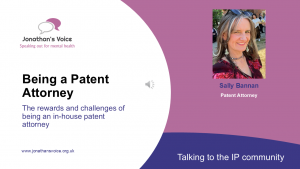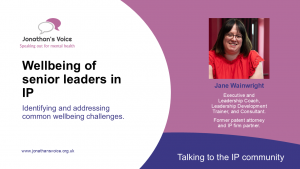Following EPI’s recent podcast series on mental health in the patent profession, Sally Bannan, an in-house patent attorney, talks to Penelope Aspinall from Jonathan’s Voice about her experiences and what she has learned along the way. If you don’t have time to read the whole blog, scroll down to the Main Takeaways section.
This article was first published in the CIPA Journal and we are grateful to be able to reproduce part of it here.
Below is part of their discussion in which Penelope asks Sally for her ideas about managing stressors as a qualified patent attorney.
Sally: Yes, there are definitely parts of the job that can get stressful, like managing a long list of deadlines, especially just before or after taking time off when things can stack up. It’s important to have strategies to help stay on top of things as well as dealing with feelings of overwhelm when it gets really busy. I’m a big fan of having my tasks well organised and prioritised. When I get this right, the volume of work doesn’t matter because I can just focus on the most important thing at any one time. If I need to, I’ll make use of extensions of time to create breathing space. It’s also helpful to communicate clearly with clients and colleagues about how you’re doing on particular tasks, if you need help, and when you expect to complete your part. And if it starts to feel too stressful, which can happen at times, reach out to a manager or colleague to let them know and get some support.
Penelope: Do you feel the intensity of this work can have an impact your general mental health?
Sally: It’s true the job can get quite intense, and at times have a negative impact on mental health. This can happen when the workload becomes unmanageable and we feel there isn’t a way to get help, either on a practical or an emotional level.
Penelope: Have you had any personal experience of this?
Sally: I did feel overwhelmed when I was establishing my career as a patent attorney as well as managing outside work. It was at a time when I was still finding my feet professionally and with my personal responsibilities I didn’t have a lot of time to replenish my energy levels. I’d say I felt pretty burnt out for a period of time juggling everything.
Penelope: How did you manage that?
Sally: Probably not very well for a while to be honest. If I had my time back, I would definitely be less afraid to get help to create more time for rest and relaxation outside work, and to be more open with colleagues when things felt difficult.
Penelope: Do you have any final words of advice for anyone in IP who might be struggling with their mental health?
Sally: If I were to offer advice to someone struggling with their mental health right now, I would say try to let someone to them know. I know that can be hard when we’re feeling really low, as our demons tend to take over our thoughts – but simply voicing in an open way how we’re feeling can be a real relief and the first step in getting onto a better track.
Penelope: Thank you so much, Sally, for being so open.
Main takeaways:
- Make sure you have a good support network, including peers, colleagues and your manager as well as friends and family.
- Make use of the resources provided by CIPA, CITMA and epi
- Develop effective mechanisms to stay on top of things and be well organised so they don’t build up.
- Prioritise and focus on one important task at a time.
- Use extensions to create breathing space.
- Communicate clearly with clients and colleagues about how you are doing and if you need extra time, help or support, ask for it.
- If you are struggling or feel overwhelmed, don’t be afraid to tell someone or ask for help sooner rather than later, even though that can feel very hard.
You can listen to all three podcasts here episodes 23rd October, 6th November, 20th November.
If you are struggling:
- Talk to your manager, someone from HR or a mental health first aider or champion
- See your GP or practice nurse
- Lawcare https://www.lawcare.org.uk/ for information, resources and support
- The Samaritans https://www.samaritans.org/ or 116 123
- In an emergency call 111, 999 or go to A & E
For more information on Jonathan’s Voice visit www.jonathansvoice.org.uk









